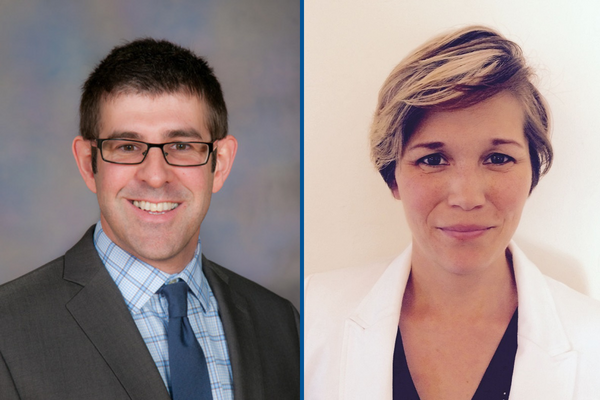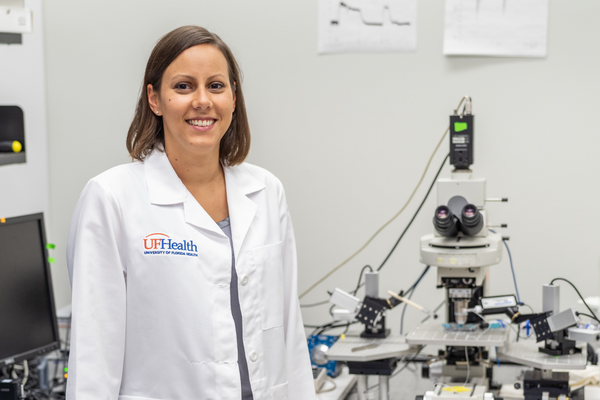By Anna Shavers
In April 2023, the Collaboration for Pilot Studies in Lewy Body Dementia (LBD) awarded $170,000 to four pilot studies to conduct pre-clinical research to improve the detection, diagnosis, and treatment of LBD.
As the second-most common form of progressive dementia behind Alzheimer’s disease, LBD affects more than 1 million people in the United States.
Funded annually by the Harry T. Mangurian Jr. Foundation, the Collaboration for Pilot Studies in Lewy Body Dementia aims to promote research for LBD at the University of Florida.
The review committee evaluated numerous proposals and selected four pilot studies based on their potential to advance understanding of LBD and to develop new treatments for the disease.

Breton Asken, Ph.D., ATC, an assistant professor of clinical and health psychology, was awarded $40,000 from the Harry T. Mangurian Jr. Foundation Lewy body dementia research fund to lead the project “Integrating Alpha-Synuclein Biomarker Testing into the 1Florida ADRC.”
Asken’s study aims to improve diagnostic accuracy of LBD during life by combining Lewy body testing through biomarker collection with similar tests for detecting Alzheimer’s disease. The study will test for the presence of abnormal alpha-synuclein, the main protein that becomes dysregulated in LBD, by collecting and testing skin samples and cerebrospinal fluid.
“By incorporating novel tests for Lewy body disease, we will improve diagnostic precision and better understand how both Alzheimer’s and Lewy body contribute to person-to-person differences in disease trajectory among patients with cognitive impairment,” said Asken.

Abbas Babajani-Feremi, Ph.D., an associate professor of neurology and artificial intelligence (AI), was awarded $70,000 from the Harry T. Mangurian Jr. Foundation Lewy body dementia research fund to lead the project “Uncovering the Neural Basis of Cognitive Fluctuations in Lewy Body Dementia: A MEG Approach.”
Babajani-Feremi’s study will use magnetoencephalography (MEG) to identify the impaired brain areas and networks that underlie cognitive fluctuations in Lewy body dementia (LBD).
“The neural mechanism underlying cognitive fluctuations (CF) in LBD is poorly understood. We hope this project will provide objective biomarkers for CF in LBD, leading to improved clinical detection, diagnosis, and disease-modifying trials,” said Babajani-Feremi, director of the MEG Lab.

Stephen Coombes, Ph.D., an associate professor of applied physiology and kinesiology, and Rachel Ho, Ph.D., a post-doctoral researcher in the Rehabilitation Neuroscience Laboratory, were awarded $20,000 from the Harry T. Mangurian Jr. Foundation Lewy body dementia research fund to lead the project “Real-time Ecological Momentary Assessments of Symptoms Including Fluctuations in Dementia with Lewy Bodies.”
Coombes and Ho’s study aims to capture and quantify changes in the cognitive, motor, sensory and autonomic function in people living with LBD. The captured data will be linked and studied with scans of brain function from a high-density electroencephalography (EEG).
“Capturing and quantifying cognitive fluctuations in real-time across minutes within a day and hours across days remains a fundamental challenge in dementia with Lewy bodies. Moreover, it is important for us to understand how these fluctuations map to neural markers, and how this varies across individuals,” said Coombes, principal investigator in the Rehabilitation Neuroscience Laboratory.

Adrienn Varga, Ph.D., an assistant professor of neuroscience and member of the Breathing Research and Therapeutics (BREATHE) Center, was awarded $40,000 from the Harry T. Mangurian Jr. Foundation Lewy body dementia research fund to lead the project “Mechanisms of Breathing Dysfunction in Dementia with Lewy Body.”
Varga’s study focuses on breathing dysfunction in LBD, which can occur very early on in the disease, and may be predictive of poorer diagnosis. Using a mouse model, the study aims to characterize the irregular breathing patterns and identify how LBD influences respiratory function at the synaptic and neural circuit level.
“Identifying the specific features of breathing dysfunction due to LDB may lead to a much-needed early biomarker. Additionally, establishing these features provides a mechanistic test-bed for resolving how brainstem respiratory networks are influenced by LDB pathology, and will serve future studies to develop innovative disease-modifying targeted interventions,” said Varga.
The Collaboration for Pilot Studies in Lewy Body Dementia is a partnership between the University of Florida, the McKnight Brain Institute and the Norman Fixel Institute for Neurological Diseases at UF Health.
“Prior years’ LBD pilot grants have had a transformational impact on grant recipients and the field of LBD. Multiple prior pilot grant recipients have used results from this funding to successfully apply for NIH grants. This is the hope of the pilot grant program – to give researchers the seed funds they need to obtain pilot data to use for follow-up grant applications,” said Melissa Armstrong, M.D., M.Sc., director of the Dorothy Mangurian Clinical-Research Headquarters for Lewy Body Dementia at the Norman Fixel Institute for Neurological Diseases at UF Health. “We remain grateful to the Harry T. Mangurian Jr. Foundation for supporting this pilot grant program and look forward to the success of this year’s recipients.”
